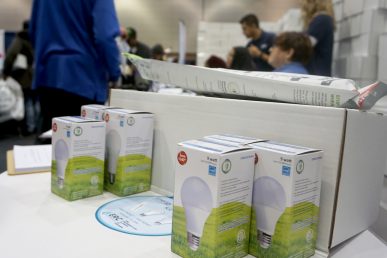UIC to provide energy-saving ‘kits’ with $3.1M in funding from ComEd
The University of Illinois at Chicago’s Energy Resources Center has received funding from ComEd to provide energy-efficient LED light bulbs, advanced power strips, and educational material to income-qualified participants in northern Illinois.
As part of a $3.1 million year-long investment, the utility company will fund the Low Income Kit Energy (LIKE) program, allowing engineers at UIC’s Energy Resources Center to provide energy-saving kits to 35,000 eligible individuals and/or families. The kits include four LED bulbs to replace 60-watt incandescent light bulbs, two LED lights to replace 100-watt incandescent bulbs and an advanced power strip. LED bulbs use approximately 85 percent less energy than incandescent bulbs. Advanced power strips help save energy by preventing power from being drawn by appliances that users think are off, but are really in standby mode, which uses a small amount of energy. The strips also provide a way to turn off energy to multiple devices at once.
To qualify for the kits, families must have incomes below 80 percent of the Area Median Income for their ZIP code.
If each item in the kit is fully installed, families can expect to save approximately $44 per year on their energy bills. In addition to the energy-saving devices, each kit contains educational material developed by the Energy Resources Center that provides no-cost and low-cost energy-saving tips.
“About 10 years ago, when energy-efficiency programs in Illinois were mandated by the Illinois Commerce Commission, the ERC began offering analytics, energy assessments and program implementation to the public,” said Stefano Galiasso, manager of energy efficiency programs in the UIC Energy Resources Center, which is based in the College of Engineering. “The challenge was to offer our services to hard-to-reach communities, and the LIKE Program is an effective way to increase awareness and participation in the energy efficiency initiatives available to Illinois residents.”
Many families and individuals will be offered the kits through their participation in a variety of other programs offered by utilities and nonprofit agencies.
“People who seek relief from their utility bill payments through established programs, such as the Low Income Home Energy Assistance Program, will be offered a kit if they meet the income criteria level,” said Oscar Mora-Diaz, an energy engineer with the UIC Energy Resources Center. “Through the LIKE program, our plan is to increase participation in other available energy-saving programs that benefit income-qualified customers, such as the Illinois Home Weatherization Assistance Program, which is sponsored by the U.S. Department of Energy, and other relevant cost-reduction programs offered by ComEd.”
This is the program’s third year under the direction of the UIC Energy Resources Center. In 2016 and 2017, the energy-savings kits reached a total of 26,000 participants that reside in the ComEd service territory. The LIKE program, along with other ComEd Energy Efficiency Program activities, supports the State of Illinois’ goal of reducing energy consumption by 2 percent this year.

